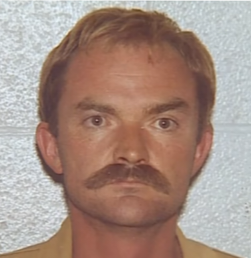Randy Kraft
 |
This article's content is marked as Mature The page Randy Kraft contains mature content that may include coarse language, sexual references, and/or graphic violent images which may be disturbing to some. Mature pages are recommended for those who are 18 years of age and older. If you are 18 years or older or are comfortable with graphic material, you are free to view this page. Otherwise, you should close this page and view another page. |
|
Randy Kraft (born March 19, 1945), also known as the Scorecard Killer, the Southern California Strangler, and the Freeway Killer (a nickname he shares with fellow serial killers William Bonin and Patrick Kearney) is an American serial killer who committed a number of murders and rapes in California between 1972 and 1983. He is responsible for the murder of a minimum of 16 young men, and is also believed to have also raped and murdered nearly 50 more men and young boys. He was a closeted homosexual in life which is most likely why his victims were almost exclusively male. Overall, he is believed to have killed 67 people in total.
Biography edit
Randy Steven Kraft was born in Long Beach, California on March 19, 1945, the fourth child and only son of Opal Lee (née Beal) and Harold Herbert Kraft. Kraft's parents had moved to California from Wyoming at the outbreak of World War II; his father was a production worker, and his mother worked as a sewing machine operator.
Kraft began committing murders in 1971. All of his suspected victims were males between the ages of 13 and 35, the majority of whom were in their late teens to mid-twenties. Kraft was charged with—and convicted of—sixteen of these homicides, all of which had occurred between 1972 and 1983. Many of his victims had been enlisted in the United States Marines Corps, and most of his victims' bodies bore evidence of high levels of both alcohol and tranquilizers in their blood systems, indicating they had been rendered insensate before they had been abused and killed.
Kraft's victims were typically lured into his vehicle with an offer of a lift or alcohol. Inside Kraft's vehicle, the victims would be plied with alcohol and/or other drugs. They were then bound, tortured, and sexually abused before they were usually killed by either strangulation, asphyxiation, or bludgeoning, although some victims had also ingested fatal doses of pharmaceuticals and at least one victim was stabbed to death. The victims would then be discarded, usually—though not exclusively—alongside or close to various freeways in southern California. Photographic evidence found at Kraft's home indicates several of his victims were driven to his house before their murder.
Many of the victims were burned with a car cigarette lighter, usually around the genitals, chest, and face, and several were found with extensive blunt force trauma to the face and head. In several instances, foreign objects were found inserted into the victims' rectums while other victims had suffered emasculation, or mutilation and dismemberment.
The majority of Kraft's murders were committed in California, although some victims had been killed in Oregon, with two further known victims murdered in Michigan in December 1982.
He was convicted in 1989 and is currently sitting on death row at San Quentin State Prison in Marin County, California.
Confirmed victims edit
- Edward Moore (20) December 24, 1972
- Kevin Bailey (17) April 9, 1973
- Ronnie Wiebe (20) July 28, 1973
- Keith Crotwell (18) March 29, 1975
- Mark Hall (22) January 1, 1976
- Scott Hughes (18) April 16, 1978
- Roland Young (23) June 11, 1978
- Richard Keith (20) June 19, 1978
- Keith Klingbeil (23) July 6, 1978
- Michael Inderbieten (21) November 18, 1978
- Donald Crisel (20) June 16, 1979
- Robert Loggins (19) August 23, 198
- Eric Church (21) January 27, 1983
- Rodger DeVaul (20) February 12, 1983
- Geoffrey Nelson (18) February 12, 1983
- Terry Lee Gambrel (25) May 14, 1983
Suspected and unidentified victims edit
Twenty-two of Kraft's estimated 67 victims remain unrecovered and/or unidentified. This is due in part to the killings having occurred in several states, with bodies being discarded in varying locations, and several entries being cryptic.
The entry upon Kraft's scorecard reading "Navy White" is believed by investigators to refer to a 17-year-old named James Sean Cox, an apprentice medic stationed at Mather Air Force Base who was last seen on September 29, 1974, hitchhiking near Interstate 5 and whose body was found several weeks later in Rancho Santa Fe. At the time of his disappearance, Cox was dressed in his white navy uniform. In addition to the color of his uniform, Cox was a blond youth.
A further entry on Kraft's scorecard, simply reading "Iowa", is believed to refer to an 18-year-old Marine named Oral Alfred Stuart, Jr., who had been born in Iowa; his body was found discarded close to a Long Beach condominium on November 10, 1974. The man had died as a result of blunt force trauma; his body remained unidentified until March 2012. Investigators note a similarity of modus operandi in the murder and body disposal of Stuart to that of other victims Kraft is known to have killed.
One unknown entry upon the scorecard simply reads "Hari Kari". This entry may refer to the stabbing murder of 30-year-old David Michael Sandt, who was found sexually assaulted and stabbed to death close to a vacant house in Long Beach on January 13, 1975. The multiple stab wounds inflicted were to Sandt's stomach, and his body was found in a kneeling position with his arms extended in front of him in a position reminiscent of the Japanese ritual suicide practice known as Hara-kiri.
